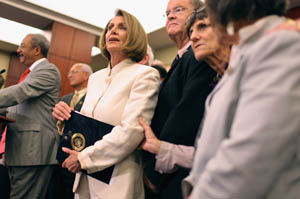
House Minority Leader Nancy Pelosi leads a rally and news conference to mark the 46th anniversary of the passage of Medicare in Washington Wednesday (Photo by Chip Somodevilla/Getty Images).
Neither the Boehner nor the Reid plans include cuts to Medicare or Medicaid. KHN’s Mary Agnes Carey talks with Jackie Judd about why that happened and what could bring these entitlements back into the deficit-reduction conversation.
Listen to the audio or read the transcript:
JACKIE JUDD: Good day, this is Health on the Hill. I’m Jackie Judd. The ongoing political drama over raising the debt ceiling and reducing spending goes on. But the most recent proposals-unlike earlier ones-say nothing about immediately changing or modifying Medicare or Medicaid. Why did those programs get taken off the table? KHN senior correspondent Mary Agnes Carey is on Capitol Hill; she’s been looking into that question. Welcome, Mary Agnes.
MARY AGNES CAREY: Thank you.
JACKIE JUDD: So the great disappearing act of Medicare and Medicaid. What happened? How did it happen?
Is Medicare Ripe For A Change?
Seven experts explore what it would take to revamp the popular health care program.
MARY AGNES CAREY: Of course, it’s not over until it’s over, especially on Capitol Hill. But it’s very clear to me that Democrats don’t see it in their political interests to make any changes in Medicare or Medicaid. I just came from a news conference with Nancy Pelosi, the Democratic leader of the House, and several of her colleagues. They were there with supporters of Medicare to celebrate its 46th anniversary, and they made it very clear that they are the protectors of Medicare, and they are the protectors of Medicaid. For months, they’ve been talking loudly against changes in a House Republican budget plan changes to Medicare and to Medicaid saying they’d do no such thing of any sort. And so I think that they have no interest and that’s why, in particular, Harry Reid, the majority leader in the Senate, his plan would not make changes to Medicare and Medicaid, because politically this is a strong point for them.
JACKIE JUDD: But even the Republican package that is supposed to be voted on shortly that Speaker Boehner put together, that doesn’t include anything either.
MARY AGNES CAREY: That’s right, and because I think that they know that, perhaps, as they go down the road, they’re going to need some Democratic support for a deficit reduction plan if it is not strong enough for conservatives in the Republican Party to back it in the House. And I also think that the Speaker sees the political problems right now for support for some of the Republican proposals on Medicare and Medicaid, and they’ve seen the public reaction. They’re looking at other areas of discretionary spending to cut; they don’t necessarily think they need to do it now. Of course, Speaker Boehner’s proposal does have a commission of other lawmakers that could look at entitlements down the road to cut, but I think there are certainly reasons why they haven’t touched it now.
JACKIE JUDD: You interviewed recently seven people from very differing professional and political perspectives. Most of them said to you that things need to get much worse for Medicare, in particular, to undergo serious changes. Where did that unanimity come from?
MARY AGNES CAREY: The thought is that if there is bipartisan agreement that there is pressure on Medicare to be insolvent, perhaps for a decade or less, that that’s when you’ll get the momentum to make changes in the program. When statements are made — every year the Medicare trustees report comes out, and if Medicare is solvent for 15 years or longer, for a lot of people that doesn’t seem like an emergency. But almost everyone said that if that got to beneath a decade, and both parties looked at it and agreed together that there had to be changes made to the program, that could create the pressure to advance some of the ideas that have been kicked around here on Capitol Hill.
JACKIE JUDD: And yet in the past couple of weeks, you’ve had some Democrats, you have had the Democratic president, talking about being willing to look at modifications, changes, reductions — whatever word you want to use — in Medicare and Medicaid. Has that somehow changed what can and may be discussed in the future? Will things be on the table in the future that seemed simply inconceivable six months ago?
MARY AGNES CAREY: I think they absolutely could be for both political and policy reasons. On the political front, I think President Obama and some Democrats do want to appeal to independents. They want to be proactive in getting entitlement spending under control. Everyone seems to agree they don’t want to really affect benefits for current beneficiaries, but looking down the road, if you made a variety of changes gradually — whether it’s a change in the eligibility age, whether it’s asking higher-income beneficiaries to pay more, taking other policy steps such as combining Part A and B deductibles or adding copays where they don’t exist — this could be the beginning of a longer conversation. It will take a lot of time and a lot of political will. But to your point, I think a lot of things are on the table now that haven’t been there before. They’re looking at the program. The number of beneficiaries are increasing. People are living longer on Medicare, and it’s putting financial pressure on the program. So I think that’s why these things are getting more attention now.
JACKIE JUDD: Thank you very much, Mary Agnes Carey of Kaiser Health News.
MARY AGNES CAREY: Thank you.